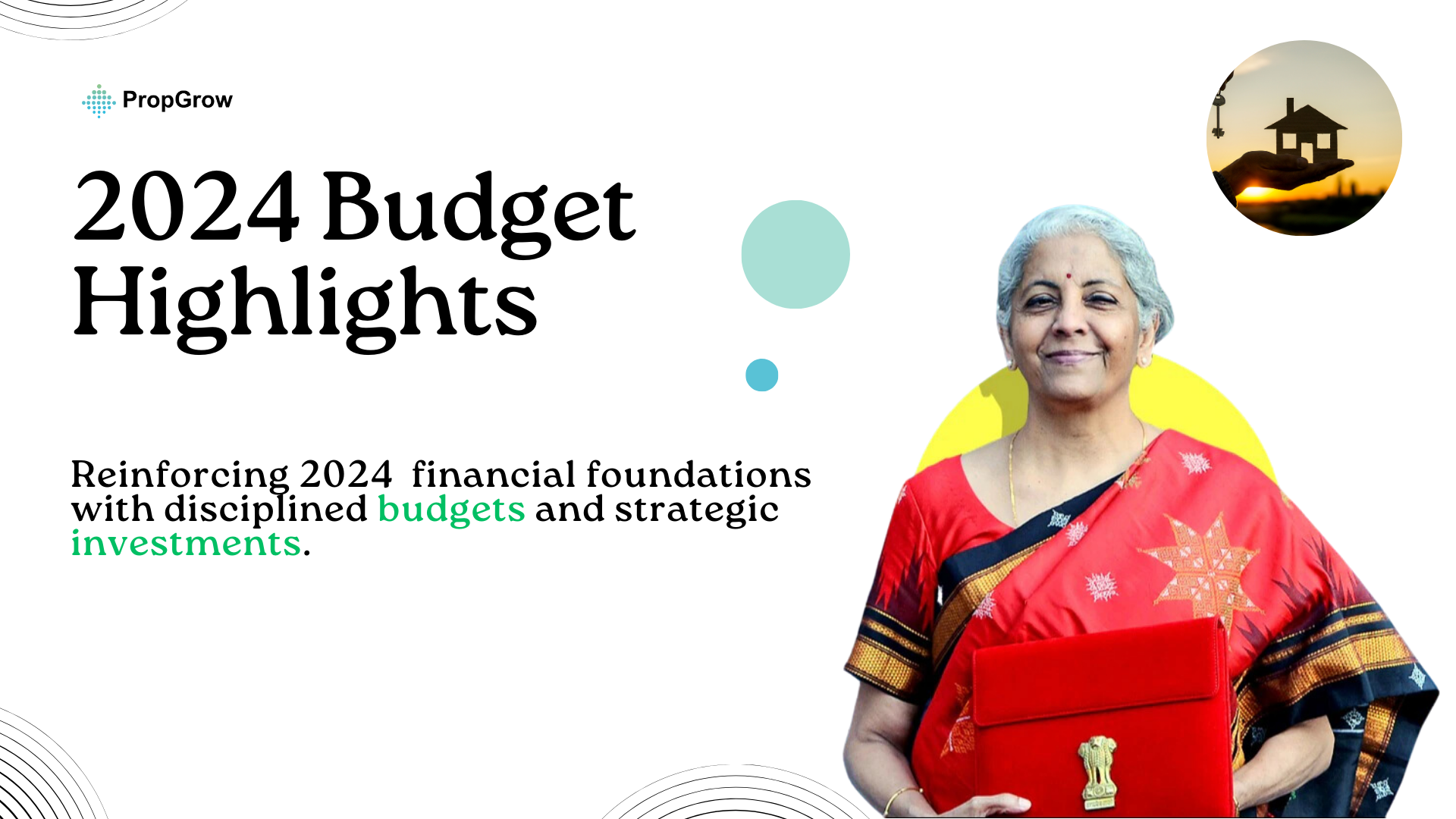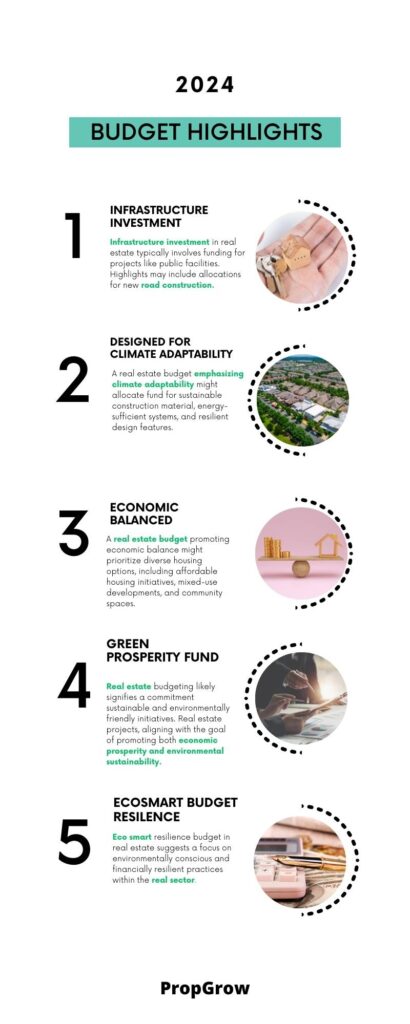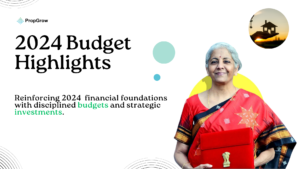
Table of Contents
2024 Budget highlights, upholding a new chapter for the real estate sector, the news regarding a housing scheme catering to the middle-income group and building 20 million homes in rural areas bodes well for the real estate industry.
Homes that are both budget-friendly and eco-friendly
In 2024 budget highlights, the focus is on creating homes that are not only budget-friendly but also environmentally conscious. The aim is to ensure the sustainable development of the real estate market by providing affordable housing options while minimizing the impact on the environment.
Such efforts not only benefit individuals seeking affordable homes but also contribute to a more sustainable and environmentally responsible real estate industry.
Various schemes have been implemented to achieve goals, such as the Green Hydrogen Mission, Energy Transition, Energy Storage projects, PM-PRANAM, GOBAR Dhan Scheme, and Green Technologies.
Infrastructure Investment
The 2024 Budget highlights the allocation of financial resources toward the development, enhancement, and maintenance of essential physical and organizational structures.
In the budget, there is a notable emphasis on directing funds to projects that aim to improve public infrastructure, such as roads, railways, airports, and smart cities.
Infrastructure investment outlined in Budget 2024 set the stage for transformative change, laying the foundation for a modern, interconnected, and adaptable society.
Real estate designed for climate adaptability
Budget 2024, directs attention towards climate resilient estate. This may include sustainable building materials, energy-efficient designs, and other measures.
The emphasis on climate adaptability reflects a forward-thinking approach to real estate development in line with the broader goals outlined in the budget for environmental sustainability.
Real estate developers incorporating climate-adaptive features may benefit from tax incentives outlined in the budget.
Encouraging developers to obtain and adhere to green building certifications, such as LEED (Leadership in Energy and Environmental Design) which set standards for sustainable construction.
Economically Balanced
The 2024 budget highlights, outlines measures to ensure that the benefits of real estate development reach all sections of society. It’s not just about constructing buildings; it’s about building a sustainable legacy for generations to come.
The intertwining of economic growth, environmental responsibility, and social inclusivity marks a paradigm shift in how we perceive and develop our living spaces.
Schemes are introduced to provide financial support to marginalized communities, enabling them to participate in real estate ventures.
This may involve grants, subsidies, or tailored financial assistance programs to ensure broader inclusiveness in property ownership.
Budget Harmony is the development of accessible infrastructure. Schemes focus on making public spaces, transportation, and essential services more inclusive, catering to individuals with diverse abilities.
Green Prosperity Fund
Budget highlights 2024 signifies a targeted financial initiative aimed at fostering sustainable and environmentally friendly practices within the framework of the budget.
The fund supports initiatives that reduce waste and promote recycling. Financial assistance may be extended to businesses and communities implementing innovative waste reduction strategies.
Green financing transcends mere financial constructs; it embodies a strategic methodology for allocating capital. This method centers around channeling funds into projects and endeavors that champion environmental sustainability, countering the detrimental impacts of climate change.
Essentially, green financing strives to guarantee that each financial investment plays a role in shaping a more sustainable and environmentally conscious future.
Eco-smart Budget resilience
Budget highlights embrace technology as a catalyst for sustainable development. Smart city initiatives, lOT-based energy management systems, and digital solutions for waste management are set to transform how real estate functions.
This includes investing in energy-efficient technologies, incorporating sustainable building materials, and implementing resource-efficient systems.
This goal is not only to reduce operational costs over time but also to create environmentally resilient and responsible real estate developments that contribute positively to both the bottom line and the planet
Implementing advanced construction techniques and materials that prioritize energy efficiency, such as using insulated structures, solar panels, and energy-efficient HVAC systems.
Eco Smart budget Resilience strategy, ensuring not only financial prudence but also environmental stewardship within the real estate sector.
Real estate’s industrial recognition
In the real estate sector, the government should confer industry status, streamline approval processes through a single window, offer tax incentives, and rationalize GST in the upcoming budget.
These initiatives would not only bolster the real estate industry but also positively impact various associated sectors.
The consistent growth of Indian real estate underscores its significance in the economy, contributing around 8% to the GDP and serving as the second-largest employment generator.
Given its pivotal role and the reliance of over 200 ancillary industries, proactive measures are crucial to enhance demand, optimize costs, and alleviate regulatory hurdles.
According to industry status, the government aims to highlight the sector’s critical role in the economy, as it contributes significantly to the GDP and serves as a substantial employment generator.
The scheme’s comprehensive approach is geared towards not only recognizing the industry but also optimizing costs and ensuring a robust and sustainable real estate ecosystem.
How about the Green Unity Coordinator?
Real estate could be a role focused on managing sustainability initiatives within a property or community. This individual would oversee environmentally friendly practices, such as energy-efficient technologies, waste reduction, and eco-friendly landscaping.
Their responsibility might also involve budgeting for sustainable upgrades, ensuring cost-effectiveness in implementing green solutions, and communicating with residents or stakeholders about the environmental benefits and cost savings associated with these initiatives.
Allocating resources for community outreach programs, promoting environmental awareness, and collaborating with local green initiatives. Budget for regular audits to assess the effectiveness of implemented measures.
Consider incentives for employees engaging in sustainable practices and funding research and development for innovative eco-friendly solutions.
This comprehensive approach will contribute to a well-rounded green budget as a Green Unit coordinator.
Regularly review the budget to ensure that allocated funds are being utilized effectively and adjust as needed to meet evolving sustainability goals.
Schemes such as community outreach programs include budget lines for organizing and participating in community events, environmental education programs, and partnerships with local organizations.

Frequently Asked Questions
Q1: What tax changes related to real estate might budget 2024 bring?
Ans:- While predictions can vary, the budget might address property taxes, capital gains taxes, or introduce new deductions for real estate investments. Keep an eye on any updates regarding tax implications for homebuyers, sellers, and property investors.
Q2: Is budget 2024 expected to address affordable housing?
Ans:- Governments often prioritize affordable housing initiatives in budgets. Look for information on funding allocations, subsidies, or incentives aimed at making housing more accessible for a broader segment of the population.
Q3: How does interest rate adjustment in the budget affect real estate?
Ans:- Changes in interest rates, if addressed in the budget, can significantly impact mortgage rates and, consequently, the affordability of real estate. Any announcements related to monetary policy or housing finance should be monitored closely.
Q4: Will the budget purpose infrastructure development impact real estate?
Ans:- Infrastructure projects can boost property values in certain areas. Check for announcements related to new transportation, utilities, or other infrastructure developments that could positively impact the real estate market in specific regions.
Q5: Are there any changes expected in property regulations or zoning laws?
Ans:- Governments may use budgets to introduce regulatory changes affecting property development, zoning laws, or building codes. Stay informed about any proposed amendments that could influence the real estate landscape.
Q6: How might the budget impact real estate financing and loans?
Ans:- The budget may introduce measures to encourage lending or provide support to financial institutions, which could indirectly affect real estate financing. Keep an eye out for any policies related to mortgage rates, loan accessibility, or down payment requirements.
Q7: Will there be incentives for green or sustainable real estate development?
Ans:- Governments often aim to promote sustainable practices in the real estate sector. Look for announcements related to tax credits, grants, or other incentives for environmentally friendly building practices or energy-efficient homes.
Q8: Could there be any changes in the property transaction process?
Ans:- Budgets may include initiatives to streamline property transactions, reduce bureaucratic hurdles, or introduce digital platforms for real estate dealings. Be attentive to any measures aimed at improving the efficiency of the real estate market.
Q9: How should stakeholders in the real estate sector prepare for the upcoming budget?
Ans:- Stay informed about budget updates, engage with industry associations, and consult financial and legal professionals for advice. Monitoring official announcements and analyzing the potential impact on your specific segment of the real estate market will help stakeholders make informed decisions.
Budget Highlights Conclusion:
In conclusion, the impact of the upcoming budget on the real estate sector is contingent on the specific policies and measures outlined.
Stakeholders should closely monitor announcements related to tax changes, affordable housing initiatives, interest rates, infrastructure development, regulatory amendments, financing options, sustainability incentives, and transaction processes.
Staying informed and adapting strategies based on budgetary implications will enable real estate investors, professionals, and homeowners to navigate potential opportunities and challenges in the evolving landscape.
As the budget unfolds, collaboration with a real estate consultant and a proactive approach to adjusting to regulatory changes will be crucial for making informed decisions within the dynamic real estate market.





